Foam rollers are now essential in modern fitness studios and gyms. Your members use them to warm up before weightlifting. They use them to recover after intense HIIT sessions. They use them in myofascial release classes. Quality foam rollers impact their training experience and your facility’s reputation.
For studio owners and gym managers, choosing the right wholesale foam roller supplier isn’t just about price. It’s about finding a partner who understands your business needs. You need someone who can deliver consistent quality at scale.
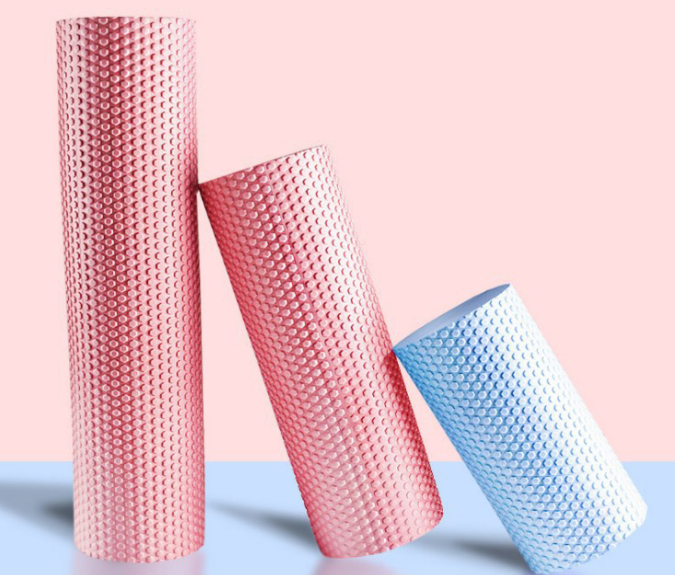
The Growing Demand for Foam Rollers in Commercial Fitness Settings
The foam roller market has grown a lot in recent years. Studios and gyms now stock multiple types of foam rollers to meet different member needs:
-
Smooth rollers for new members just starting their recovery journey
-
Textured and grid-pattern rollers for experienced athletes seeking deeper tissue work
-
Vibrating foam rollers for premium facilities offering advanced recovery technology
-
Different density options from soft to extra-firm for different body types and pain tolerances
This variety means you need a supplier who can provide a wide product range. One or two basic options won’t cut it.
I recommend partnering with a reliable foam roller supplier. It affects every aspect of your business operations. The difference between a mediocre supplier and an excellent one often shows up after you’ve placed your order. This is why I believe thorough research before committing matters so much.
Key Factors When Choosing a Foam Roller Supplier
Finding the right foam roller supplier for your commercial fitness facility takes effort. I’ll show you the critical factors that separate great suppliers from average ones.
Material Quality and Construction Standards
The material impacts lifespan and performance. Three main foam types dominate the commercial market:
EVA Foam (Ethylene-Vinyl Acetate): This is the gold standard for commercial facilities. EVA foam offers superior density and durability. It resists compression even after thousands of uses. Quality EVA rollers maintain their shape and firmness for 3-5 years in high-traffic gyms. I’ve seen studios save 40-60% on replacement costs by investing in EVA foam from the start.
EPP Foam (Expanded Polypropylene): EPP provides excellent impact resistance. It maintains performance across temperature variations. This material works well for textured and grid-pattern rollers. It costs a bit more than EVA but offers similar durability. EPP foam recovers fast from compression. This makes it ideal for back-to-back class sessions.
PE Foam (Polyethylene): This is the budget option. PE foam costs less upfront but loses density faster under commercial use. Most PE rollers need replacement within 12-18 months in busy facilities. I recommend PE foam for low-traffic areas or guest amenities. Don’t use it for main training floors.
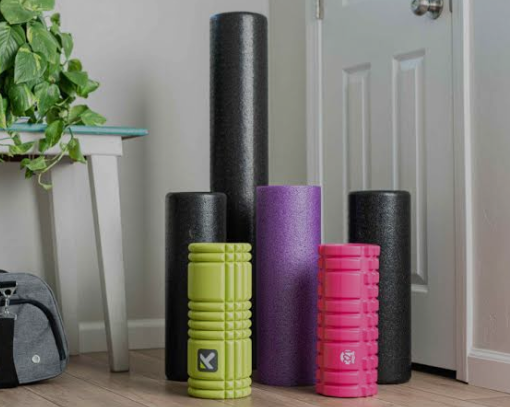
Product Range and Size Variety
Your members have different body types, fitness levels, and recovery needs. A good supplier should offer:
Standard lengths: 12-inch, 18-inch, and 36-inch rollers cover most applications. The 36-inch length works best for full spine rolling and partner exercises. Compact 12-inch versions fit well in small studio spaces and travel bags.
Diameter options: 4-inch, 5-inch, and 6-inch diameters serve different purposes. Larger diameters provide gentler, more stable rolling. Smaller diameters target deeper tissue work. Stock multiple options to accommodate beginners and advanced athletes.
Texture variations: Smooth surfaces for sensitive users and newcomers. Medium-textured surfaces for general myofascial release. Deep-grid patterns for intense trigger point therapy. Vibrating models for premium recovery services.
I suggest requesting product samples before placing large orders. Test them yourself and with your trainers. See how they perform under real training conditions.
Customization and Branding Capabilities
Custom-branded foam rollers transform basic equipment into powerful marketing assets. Look for suppliers offering:
Logo printing options: Screen printing, heat transfer, or embossing. Quality printing shouldn’t fade or peel after months of use and cleaning. Ask to see samples of logo applications on used rollers, not just fresh products.
Color customization: Match your brand colors across your equipment. Some suppliers offer Pantone color matching for perfect brand consistency. Custom colors often require minimum order quantities of 100-500 units depending on the supplier.
Packaging solutions: Retail-ready packaging helps if you sell rollers to members. Custom packaging with your branding, product information, and usage instructions adds value. This justifies higher retail prices.
Lead times for custom orders: Standard custom orders take 30-45 days from approval to delivery. Rush services may be available at premium pricing. Factor these timelines into your facility planning and inventory management.
Certifications and Environmental Standards
Responsible sourcing matters to modern fitness consumers. Many gym members ask about green equipment. Verify your supplier maintains:
Product safety certifications: Look for ISO 9001 quality management certification. REACH compliance ensures materials meet European chemical safety standards. SGS testing certificates verify product specifications and safety claims.
Environmental credentials: Green foam production methods reduce environmental impact. Some suppliers use recyclable or biodegradable materials. Water-based adhesives eliminate harmful chemical emissions. These certifications help you market your facility as green.
Factory audits: Ethical suppliers welcome transparency about their manufacturing processes. BSCI or similar social compliance certifications indicate fair labor practices. This matters if your brand values align with ethical sourcing.
Minimum Order Quantities and Pricing Structure
Understanding the supplier’s order requirements and pricing helps you plan inventory investment:
MOQ (Minimum Order Quantity): Some suppliers require minimum orders of 50-100 units. Others offer lower MOQs for first-time buyers or mixed orders. Higher MOQs unlock better per-unit pricing. Calculate whether the savings justify the larger upfront investment and storage needs.
Volume discount tiers: Quality suppliers offer clear pricing tiers based on order volume. For example: 50-99 units at $12 each, 100-299 units at $10 each, 300+ units at $8.50 each. These tiers help you plan growth and expansion.
Mixed order flexibility: Can you combine different sizes, textures, and colors in one order to meet MOQ thresholds? Flexible suppliers let you create diverse inventory. You won’t need to commit to hundreds of identical rollers.
Shipping Reliability and Logistics Support
Even perfect products lose value if they don’t arrive when you need them:
Shipping costs and methods: Foam rollers are lightweight but bulky. This affects shipping costs. Clarify whether quoted prices include shipping or if it’s calculated as an extra charge.
Delivery timeframes: Standard delivery ranges from 15-30 days for stock items. Custom orders take longer. Request guaranteed delivery dates for time-sensitive orders like pre-opening facility stockups or seasonal promotions.
International shipping experience: If you’re importing from overseas suppliers, verify their export documentation expertise. Proper customs paperwork prevents expensive delays. Experienced suppliers handle HS codes, commercial invoices, and packing lists well.
Tracking and communication: Professional suppliers provide tracking numbers and proactive updates. They notify you right away about any potential delays. This transparency lets you adjust class schedules or retail plans as needed.
Top Foam Roller Suppliers For Wholesale Studios & Gyms
I’ve tested products from dozens of foam roller manufacturers. Here are the suppliers that deliver quality, reliability, and value for commercial fitness facilities.
1. FDM Yoga – Premium Customization and Sustainable Materials

FDM Yoga stands out for studios seeking custom-branded equipment with green credentials. This Chinese manufacturer specializes in yoga and fitness accessories for wholesale buyers.
What Makes FDM Yoga Different: Their customization beats most competitors. You can specify exact Pantone colors, logo placement, and custom packaging designs. I’ve seen their custom rollers in boutique studios across three continents. The branding quality stays sharp even after years of use.
Product Range: They offer EVA and EPP foam rollers and cork rollers in all standard sizes (12″, 18″, 24″, 36″). Diameters range from 4″ to 6″. Texture options include smooth, semi-textured, and deep-grid patterns.
Sustainability Focus: FDM Yoga maintains Reach certification. They use water-based adhesives and eco-friendly packaging materials. Their foam production generates 30% less waste than traditional methods. This matters if your studio markets itself as green.
Pricing Structure: MOQ starts at 100 units for standard colors. Custom colors need 300-unit minimums. Pricing ranges from $3-8 per unit depending on size and customization. Volume discounts start above 500 units.
Delivery Performance: Standard lead time is 25-35 days for stock items. Custom orders take 40-50 days from design approval. They ship via sea freight for large orders and provide detailed tracking. In my experience, their delivery estimates are accurate within 3-5 days.
Best For: Mid-sized to large studios wanting branded equipment. Facilities that value sustainability. Gyms planning retail sales with custom packaging.
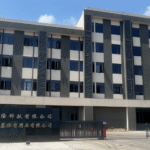
Related Reading: Best 5 Custom Tpe Yoga Mat Factory For Yoga Studio
2. TriggerPoint – Innovation-Driven Premium Supplier
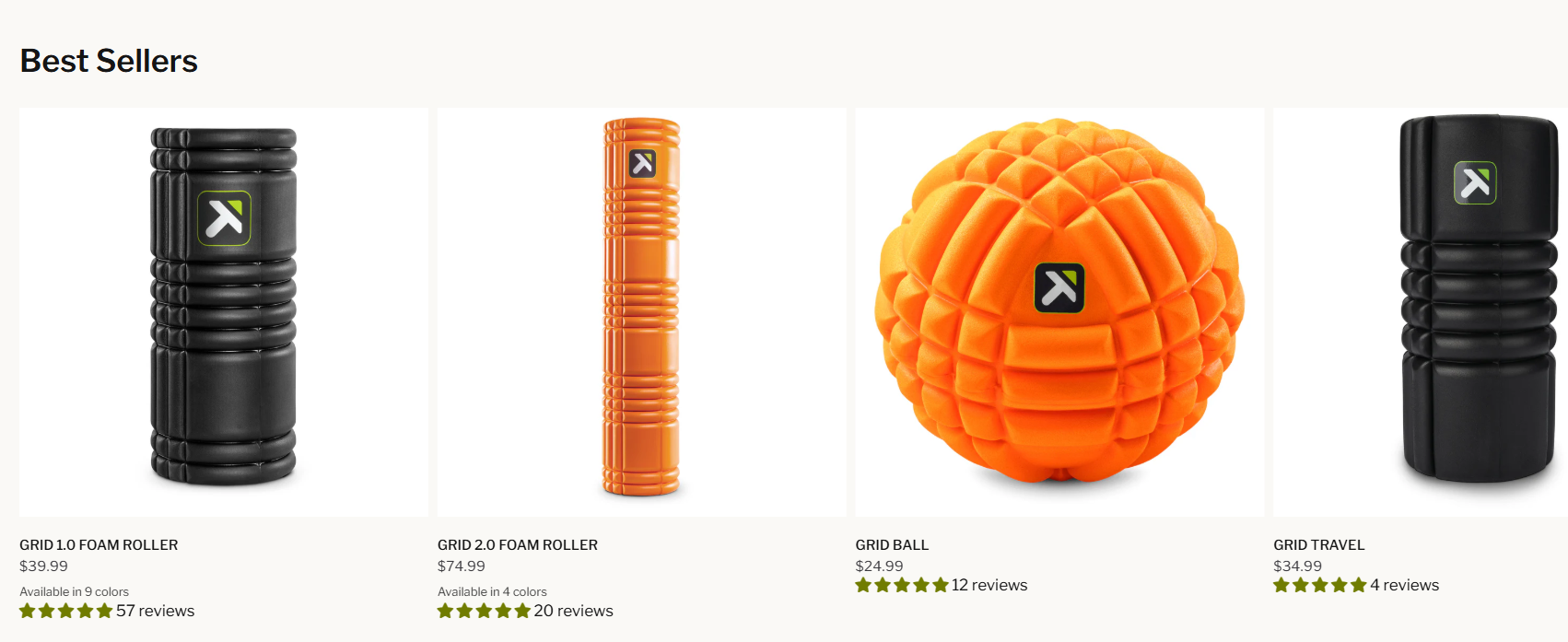
TriggerPoint changed foam rolling with their GRID technology. I recommend them for facilities offering advanced recovery services.
Signature Technology: The GRID pattern mimics massage therapist hands. The multi-density exterior wraps around a rigid hollow core. This design keeps firmness while providing targeted pressure. Their patented design has held up through clinical testing and real-world commercial use.
Product Innovation: TriggerPoint offers the GRID Vibe vibrating roller. It delivers 33Hz vibration frequency proven to increase range of motion. Their CORE roller features a firmer density for spine work. The GRID Mini works well for targeted trigger point release.
Quality Standards: All TriggerPoint products undergo tough durability testing. They guarantee their rollers won’t lose shape or firmness for 12 months under commercial use. I’ve tracked rollers in high-volume CrossFit boxes. They kept performing beyond the warranty period.
Wholesale Program: TriggerPoint requires dealer authorization for wholesale accounts. Once approved, you access tiered pricing based on volume. Minimum initial order is $500 retail value. Discounts range from 40-50% off retail depending on volume commitments.
Educational Support: They provide free instructor training resources. This includes video tutorials, usage guides, and programming ideas. Their education portal helps trainers get more from rollers in classes. This adds value beyond the physical products.
Pricing Reality: TriggerPoint products cost more than generic alternatives. Standard GRID rollers wholesale around $18-25 each. GRID Vibe models run $65-85 wholesale. The premium pricing reflects innovation and proven performance.
Best For: Premium studios and gyms. Facilities that focus on recovery and mobility programming. Trainers wanting educational resources and brand recognition.
3. Yes4All – Diverse Selection with Competitive Wholesale Pricing
Yes4All operates as a fitness equipment aggregator. They source from multiple manufacturers and offer wide variety under one ordering system.
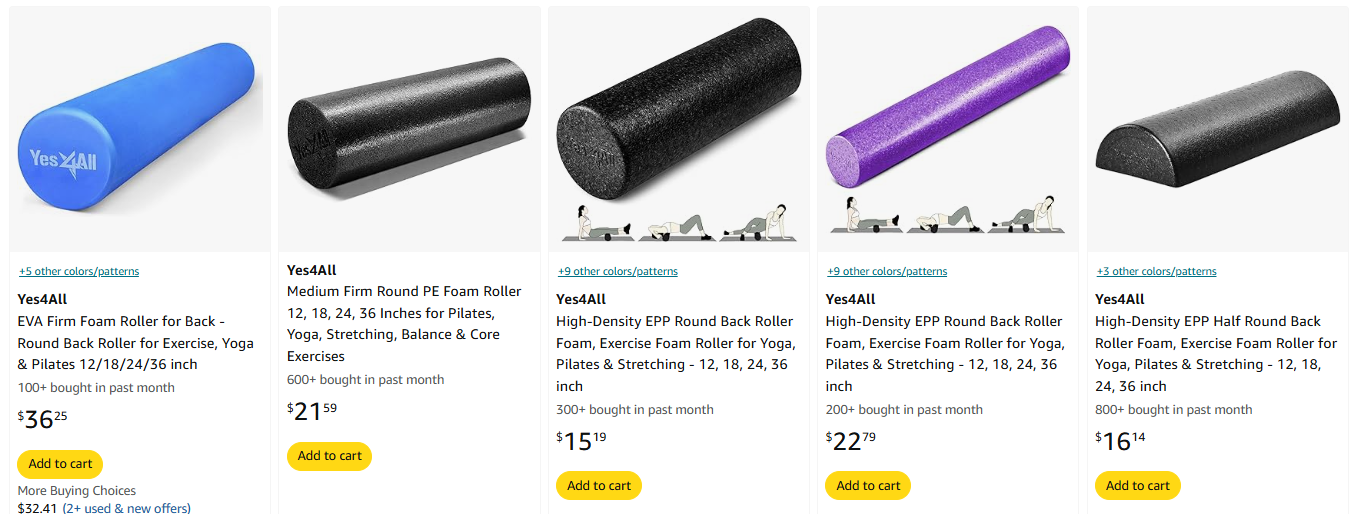
Product Diversity: Yes4All’s foam roller catalog includes over 30 variations. You’ll find standard smooth rollers, deep-tissue grid patterns, 2-in-1 roller-ball combos, and hollow core designs. They stock unusual sizes like 24″ half-round rollers for balance training. This variety helps facilities offer complete options.
Color and Style Options: Unlike suppliers with limited color choices, Yes4All stocks 8-12 colors per roller style. Bright colors, earth tones, and classic black all available. Multiple colors help with class organization (beginners use blue, advanced use black) without custom ordering.
Pricing Competitiveness: Their wholesale pricing beats many competitors. Standard 36″ rollers cost $7-10 wholesale. Textured versions run $9-13. Even specialty items like vibrating rollers price 20-30% below premium brands. MOQ requirements start at just 50 units total across all products.
Quality Considerations: Yes4All sources from various factories. Quality varies between product lines. Their premium EVA foam rollers perform well. Budget PE foam options show faster wear. Read product specs and request samples before large orders.
Amazon Integration: Yes4All keeps a strong Amazon presence. This helps if you plan to resell through Amazon. You can even dropship certain items to customers. Their fulfillment network supports multi-channel retail strategies.
Customer Service Experience: Response times average 24-48 hours for wholesale inquiries. Their support team handles basic questions well but lacks deep product expertise. Complex customization requests may take longer to process.
Best For: Multi-location gyms needing diverse inventory. Facilities wanting color variety without customization costs. Studios building retail inventory across multiple sales channels. Budget-focused buyers who value selection over premium features.
Why I Recommend FDM Yoga
FDM Yoga offers three things I value most: premium customization, sustainable manufacturing, and factory-direct pricing. This combination works for businesses of any size.
Unmatched Customization Options for Brand Building
FDM Yoga beats most competitors in customization. You can specify exact Pantone colors. You can choose logo placement. You can design custom packaging. I’ve seen their custom rollers in boutique studios . The branding quality stays sharp after years of use.
This level of customization turns basic equipment into marketing assets. Your custom-branded foam rollers become walking ads. Members take them home or use them in your space. The logo printing doesn’t fade or peel after months of use and cleaning. Lower-quality suppliers struggle with this.

Complete Product Range for Every Member Need
FDM Yoga offers EVA and EPP foam rollers in all standard sizes: 12″, 18″, 24″, and 36″ lengths. Diameters range from 4″ to 6″. This variety covers everything from compact travel rollers to full-length spine work.
Texture options include:
– Smooth surfaces for sensitive users and newcomers
– Semi-textured surfaces for general myofascial release
– Deep-grid patterns for intense trigger point therapy
Factory-Direct Pricing Structure
Pricing ranges from $3-8 per unit. This depends on size and customization. Volume discounts start above 500 units. They offer Net 30 payment terms for established clients.
This factory-direct model cuts out distributor markups. You buy straight from the manufacturer. The savings become significant for multiple locations. They also help if you’re building retail inventory.
MOQ starts at 100 units for standard colors. I find this reasonable for mid-sized studios. It works for initial equipment purchases or annual restocking. The pricing tiers reward growth. They don’t force massive upfront commitments.
Reliable Delivery Performance
Standard lead time is 25-35 days for stock items. Custom orders take 40-50 days from design approval. They ship via sea freight for large orders. They provide detailed tracking.
In my experience, their delivery estimates are accurate within 3-5 days. This reliability matters for facility openings. It matters for seasonal promotions. It matters for class schedule changes. You won’t face unexpected delays that disrupt your operations.
FDM Yoga handles export documentation well. Proper customs paperwork prevents expensive delays at ports. Their experience with international shipping shows in smooth delivery timelines. I appreciate the predictability.
Ideal Fit for Growing Fitness Businesses
I suggest FDM Yoga for mid-sized to large studios wanting branded equipment. Facilities that value sustainability find their environmental credentials compelling. Gyms planning retail sales benefit from their custom packaging options.
Are you operating a boutique studio building brand identity? FDM Yoga’s customization capabilities let your equipment strengthen your visual identity. Every touchpoint can align with your brand guidelines. This includes roller color. This includes logo placement.
For multi-location gym chains, their volume pricing and consistent quality support standardized equipment across all facilities. Members get the same experience at your downtown location and suburban branch.
Conclusion
I believe picking the right foam roller supplier affects three key areas. It shapes your equipment quality. It impacts member satisfaction. And it drives your long-term profits. The suppliers I’ve reviewed each have unique strengths. They fit different business needs.
Looking back on my journey in the fitness industry, I’ve learned that equipment choices reveal your priorities to members every single day. The foam rollers sitting in your studio corner aren’t just recovery tools—they’re promises you make about quality and experience. I’ve watched studios thrive by partnering with suppliers who understand this. Choose wisely, invest in relationships that support your growth, and your members will feel the difference in every roll. That’s what separates good facilities from truly exceptional ones.

